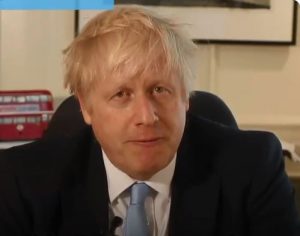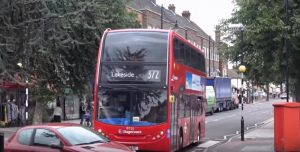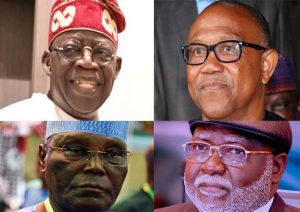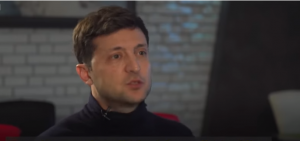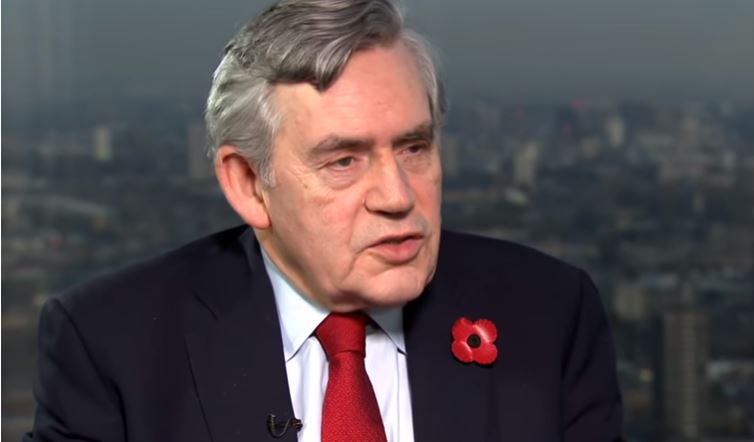
May 20, 2019. The Guardian, UK: The Electoral Commission is under mounting pressure to launch an investigation into the funding of Nigel Farage’s Brexit party because of concerns that its donation structure could allow foreign interference in British democracy.
Before Thursday’s crucial European elections, Gordon Brown has written to the Electoral Commission calling on it to urgently examine whether the party has sufficient safeguards on its website to prevent the contribution of “dirty money”.
The former Labour prime minister will use a speech in Glasgow on Monday to say an investigation into the Brexit party’s finances is urgent and essential.
“Nigel Farage says this election is about democracy. Democracy is fatally undermined if unexplained, unreported and thus undeclared and perhaps under the counter and underhand campaign finance – from whom and from where we do not know – is being used to influence the very elections that are at the heart of our democratic system,” he will say, according to pre-released extracts.
“Now Mr Farage heads a new Brexit party, which is making questionable claims about the true source of its funding at a time when the Electoral Commission has warned of the dangers of multiple, small, anonymous donations being a cover for dirty money.”
While other parties require personal information from donors, the Brexit party allows donations of less than £500 via just a PayPal account, which critics said leaves the way open to abuse by foreign donors wishing to influence British elections.
Brown’s intervention comes after Farage boasted that the party was attracting donations of £100,000 a day. He told the Telegraph that about 2,000 individual donors were signing up daily.
It was echoed by Labour’s Ben Bradshaw, who said: “It’s absolutely essential that there’s an urgent investigation into this.
“The fact that it’s three years after a referendum that was subverted by dark money, it’s absolutely incredible that nothing has happened. Some at the NCA and at the Electoral Commission have to wake up. We’re facing a real threat to our democracy.”
In his speech, Brown will also support calls for the European parliament to examine whether Farage has received undeclared funding personally in his time as an MEP after a Channel 4 investigation found that he had benefited from £450,000 from the businessman Arron Banks.
Brown will claim Banks’s commercial interests “have never been fully and satisfactorily divulged”, and point to his “long-term contacts with Russia”.
LSE professor Damian Tambini said the loopholes in the donation structure were a serious problem. “Our election finance controls are failing,” he said. “UK law has strict bars on foreign finance of election communications, and overall limits on campaign spending … The Electoral Commission should signal that they are looking into this.”
The warnings come at a time of more questions about the Brexit party’s links to a disgraced former aide to Farage who was imprisoned in the US after being caught offering money laundering services to undercover federal agents. George Cottrell was with Farage when he was arrested at Chicago O’Hare airport in July 2016. He had been working in Farage’s office and claimed on his LinkedIn account to have co-directed Ukip’s EU referendum campaign fundraising.
He was charged with 21 counts including money laundering, wire fraud, blackmail and extortion. He would later plead guilty to participating in a scheme to “advertise money laundering services on a Tor network black market website” and served eight months in prison.
After the arrest, Farage called Cottrell a “22-year-old unpaid volunteer and party supporter” and said he knew nothing of the allegations.
The Guardian understands that Cottrell has told friends that he is now overseeing the Brexit party’s fundraising operation. On Sunday the Sunday Times also reported that a senior source in the party said that Cottrell had “reprised his role as one of [Farage’s] top fundraisers”.
A spokesman for the Brexit party said Cottrell had “no official position with the party and is not paid by the party”. He declined to deny Cottrell’s unpaid involvement. Cottrell’s previous fundraising role with Ukip was in “an unpaid role”, according to an interview he gave the Telegraph after his release.
When told that the Guardian had seen photographs of Farage and Cottrell together in recent months including at Brexit party events, he said: “Tens of thousands of supporters have been to Brexit party events, as has Mr Cottrell. By your logic, all of them have positions in the party.”
On the issue of foreign donations, the Brexit party spokesman said: “Rigorous checks are carried out on all donations over the declarable threshold to ensure that they are admissible in accordance with electoral law.” Only donations over £500 have to be declared under British law.
The allegation of Cottrell’s involvement with the Brexit party caused shock among MPs. Damian Collins, the chair of the select committee for digital, culture, media and sport, said: “No credible political party in Britain would go anywhere near George Cottrell in the light of his previous convictions. It seems extraordinary that someone convicted of a money-laundering offence should be anywhere near their finances.”
Collins added: “There’s this huge question around transparency. No one knows who’s really donating this money. What we do know is that transactions online can be very easily exploited.”
Darren Hughes, the chief executive of the Electoral Reform Society, said: “Election rules should be followed to the spirit as well as the letter of the law given the tight timeframes of a campaign.
“Issues like these, exacerbated by online campaigning, once again demonstrate why we need a comprehensive review of our electoral laws to ensure they are fit for the 21st century.”
A spokesperson for the Electoral Commission pointed the Guardian to a previous statement. “The Brexit party, like all registered political parties, has to comply with laws that require any donation it accepts of over £500 to be from a permissible source,” they said. “It is also subject to rules for reporting donations, loans, campaign spending and end-of-year accounts.
“These rules are in place to ensure fairness and transparency of all political party finance. As part of our active oversight and regulation of these rules, we talk regularly to parties, including the Brexit party, about ensuring they have robust systems in place so that they comply with the law. If we see evidence to suggest the rules have been broken, we will consider it in line with our enforcement policy.”

